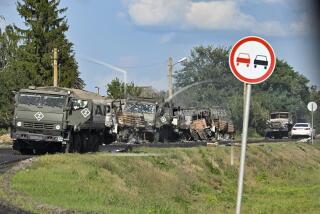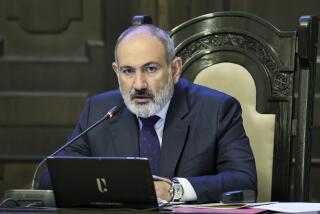Russia Sends Army to Protect Railway in Georgia : Civil war: The Caucasus nation’s forces beat back an assault by rebels on its second-largest city. Moscow says it will not intervene in the fighting.
- Share via
TBILISI, Georgia — Heeding an urgent appeal by Georgian leader Eduard A. Shevardnadze, Russia agreed Wednesday to deploy army troops along this country’s main railroad and protect it from rebels trying to overthrow him.
By evening, there were signs that the Russian army was moving into position as Shevardnadze’s forces beat back a rebel assault on Kutaisi, Georgia’s second-largest city, and moved to recapture Poti, its main Black Sea port.
They also retook two smaller towns seized this week by the rebels, who are loyal to the ousted president, Zviad Gamsakhurdia.
“A long column of Russian tanks and armored personnel carriers moved out of Kutaisi this afternoon, and it looks like the Russians have begun the operation to secure the railroad,” Teimuraz Shashiashvili, the city’s mayor, said in a telephone interview.
The deployment is a milestone in Moscow’s effort to dominate the newly independent republics that emerged from the collapse of the Soviet Union in late 1991. It came a day after the Georgian Parliament swallowed nationalist pride and voted to back Shevardnadze’s request to become the 12th member of the Commonwealth of Independent States, an alliance of the old Soviet republics led by Moscow.
About 10,000 Russian soldiers, remnants of the Soviet army, are based in Georgia. Until Shevardnadze’s appeal Tuesday night, his government had been negotiating for their withdrawal. Russian diplomats and Georgian officials said about 2,000 of the troops were now being assigned to ride freight trains across embattled western Georgia, protecting shipments between Poti and the capitals of Georgia, Armenia and Azerbaijan.
The Russian Foreign Ministry said troops from Armenia and Azerbaijan, as well as Russia, would take part in the operation. It said the armed escorts will act “exclusively” to ensure passage of food, medicine and other vital cargo to all three capitals and will not intervene in Georgia’s civil war.
But Alexander Kavsadze, a Georgian official who met with reporters in Moscow, added that “force will have to be used” against the rebels if they attack the escorts.
In a mushrooming offensive, Gamsakhurdia’s rebels have seized most of western Georgia, curtailing rail and road traffic across a range of hills that divide the country. Officials in Tbilisi, the capital, which is east of the range, announced plans to ration pasta, sugar, margarine and cooking oil and to reduce bread rations in the city.
The rebels attacked Kutaisi on Wednesday, hoping to cut off the west completely. With Shevardnadze’s army in disarray, hundreds of paramilitary troops, policemen and other volunteers rushed to defend the city, whose normal population of 250,000 has grown in recent days by at least 15,000 refugees from fighting elsewhere.
The counterattack was led by Dzhaba Ioseliani, 67, charismatic commander of the Sakartvelos Mkhedrioni, or Knights of Georgia, a violent, ganglike paramilitary group that Shevardnadze tried to expel from the army last spring. It is now his strongest defense.
“There is no problem about holding Kutaisi,” Ioseliani said in the mayor’s office Wednesday, according to the British news agency Reuters. In what he called “just the beginning of a real offensive,” Ioseliani said his men had killed 25 rebels and lost one of their own in a two-hour clash north of the city.
The Interior Ministry said Shevardnadze’s forces also recaptured the nearby towns of Khoni and Lanchkhuti. The latter is Shevardnadze’s hometown. There were conflicting reports as to whether the government had retaken Poti, which the rebels seized Sunday.
Gamsakhurdia led Georgia to independence 2 1/2 years ago and was its first democratically elected president. He was overthrown in January, 1992, by former allies who accused him of dictatorial rule.
Shevardnadze, a former Soviet foreign minister, returned from Moscow to take over as chairman of a new State Council two months later, only to preside over his native country’s disintegration.
More to Read
Sign up for Essential California
The most important California stories and recommendations in your inbox every morning.
You may occasionally receive promotional content from the Los Angeles Times.













